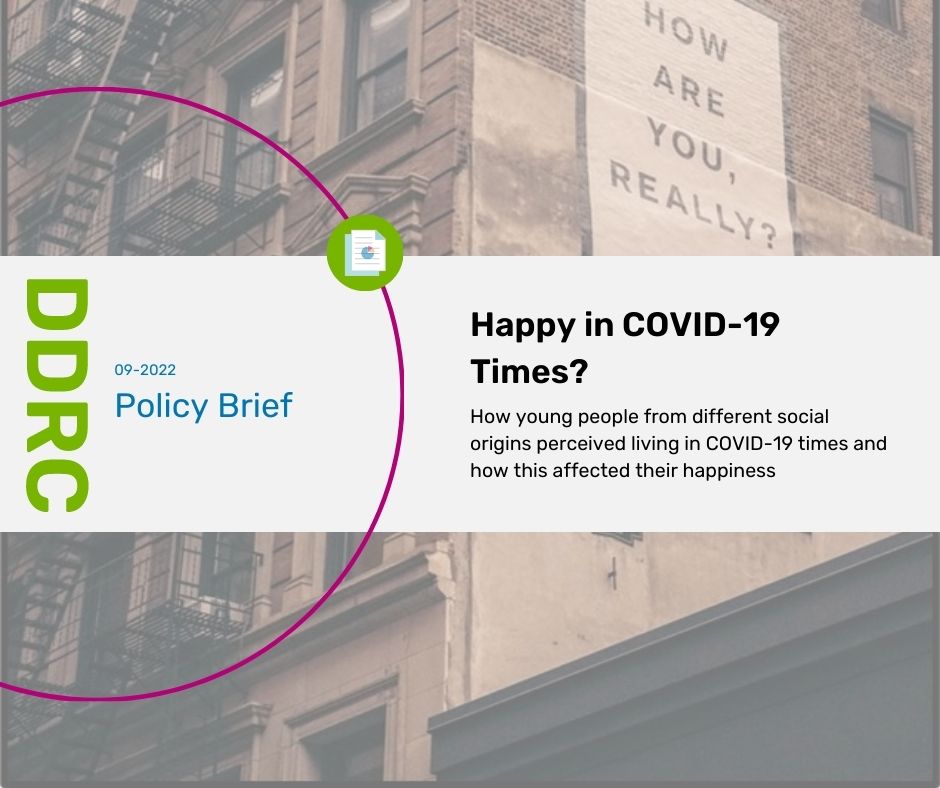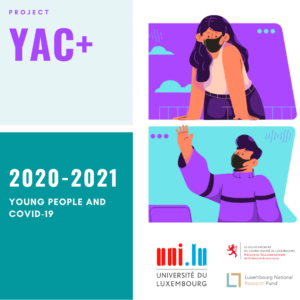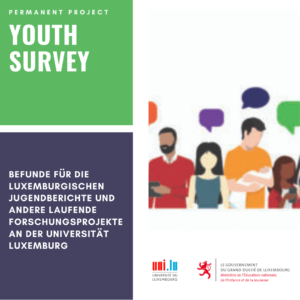In this policy brief, we present the results of recent research conducted at the Centre for Childhood and Youth Research. We asked young people in Luxembourg whether they are happy in times of COVID-19.
We wanted to find out how young people’s perceptions of the COVID-19 pandemic are related to their happiness levels. Furthermore, we investigated to what extent these perceptions were still relevant for their happiness levels after one year of the pandemic and to what extent these perceptions mattered for young people from different social backgrounds.
We defined perceptions of living in COVID-19 times as the extent to which young people felt about and coped with the current COVID-19 pandemic. We defined happiness as subjective well-being (Veenhoven, 2012).
Growing empirical evidence shows that global crises, such as the COVID-19 pandemic, can have severe long-term psychological consequences. They may persist even after the end of a particular crisis.
Governments are increasingly considering this finding when designing their recovery policies and preparing for future crises (Mondino et al., 2020).
Jump to content
Literature review: How perceptions research matters
In addition to traditional material indicators such as GDP growth, unemployment, or inflation rates, policy makers and academics increasingly consider how citizens experience and perceive macro crisis contexts.
When we look at people’s perceptions, it is particularly crucial to understand how social origin shapes them: Depending on one’s perceived social origin (that is, depending on whether you come from a working class, middle class, or rich family), different perceptions of the reality may develop and influence one’s happiness (Bandura, 1999).
Observing, for instance, individuals of middle social origin, researchers consistently find them to have higher educational and career ambitions than their counterparts of lower social origin.
When these aims are more difficult to attain, as is the case in times of macro crises, the well-being of individuals from middle social origin might be more negatively affected than is the case with young people with lower aspirations (low social origin) or more resources (high social origin; Kiess and Lahuseen, 2018).
Research design: Which young people took the survey and when?
It is important to understand how young citizens perceived living in the COVID-19 context, because this advances our understanding of how inequalities may be experienced during and after a crisis and what the consequences are for well-being.
We focused our analysis on Luxembourg, surveying the same young people (12 to 29 years) in two points in time: few months after the outbreak of the pandemic in the country (July 2020) and one year later (July 2021).
Researching young people’s perceptions and happiness in the context of Luxembourg is particularly relevant: Even though the country ranks highest in GDP per capita in the world and is one of the happiest (Helliwell et al., 2021), it has one of the highest percentages of working individuals that can be considered poor in the EU (i.e. 11.9%), the majority of them between 18-24 years old.
Findings: The pandemic left all young people unhappier but some more so than others
Researching how young people’s perceptions of living in COVID-19 times were associated with their happiness levels, three main results emerged:
- The perceptions of living in a COVID-19 context mattered for the happiness of the young population in Luxembourg.
- These perceptions mattered the same for the young population’s happiness in two points of time where the COVID-19 pandemic effects in Luxembourg were relatively minor.
- Compared to young people from middle social origins, perceived conditions seemed to especially matter for the happiness of the young people from high and low social origins.
The first result shows that the COVID-19 pandemic had a clear negative psychological impact on all young people in Luxembourg.
Relatedly, the second result shows that perceptions of living in a COVID-19 context still mattered for the happiness of the young individuals after signs of recovery were present in the Luxembourgish society. This result highlights how young individuals still dealt with the psychological effects of global crises even when the immediate harmful effects of a crisis had started to recede.
Third, and most strikingly, the way young individuals experienced the pandemic times significantly depended on their social origin. Yet, contrary to what our literature review suggested, it was not individuals of middle social origin who were affected most:
Young individuals of very high social origin and of very low social origin found it much more difficult to cope with the pandemic than young individuals with middle social origin. Accordingly, the happiness of the extreme parts of Luxembourg’s young population was more strongly affected. This was a surprising finding.
Conclusion: How can we explain this variation?
We argue that the privileged position, young individuals of high social origin in Luxembourg grew up in, may have left them psychologically vulnerable to cope with a major crisis like the COVID-19 pandemic, creating uncertainties and restricting their freedoms and lifestyle for the first time in their lives.
In contrast, young individuals of middle social origin in Luxembourg may have been more accustomed to deal with adversities in life. This might explain their greater coping repertoire and resilience strategies. They were possibly more confident that the pandemic would eventually be overcome, especially when recovery signals were present.
Finally, Luxembourg has a high percentage of young individuals of lower social origin who are working poor. This could explain why young people of low social origin may have felt particularly vulnerable, pressured, and anxious to secure their socio-economic position during the pandemic.
In conclusion, our findings suggest that policymakers should consider the persistent negative psychological effects of macro crises on young individuals’ perceptions and their specific social origin when designing, implementing, and examining policies that have the objective to promote individual and social welfare during and after global crises.







